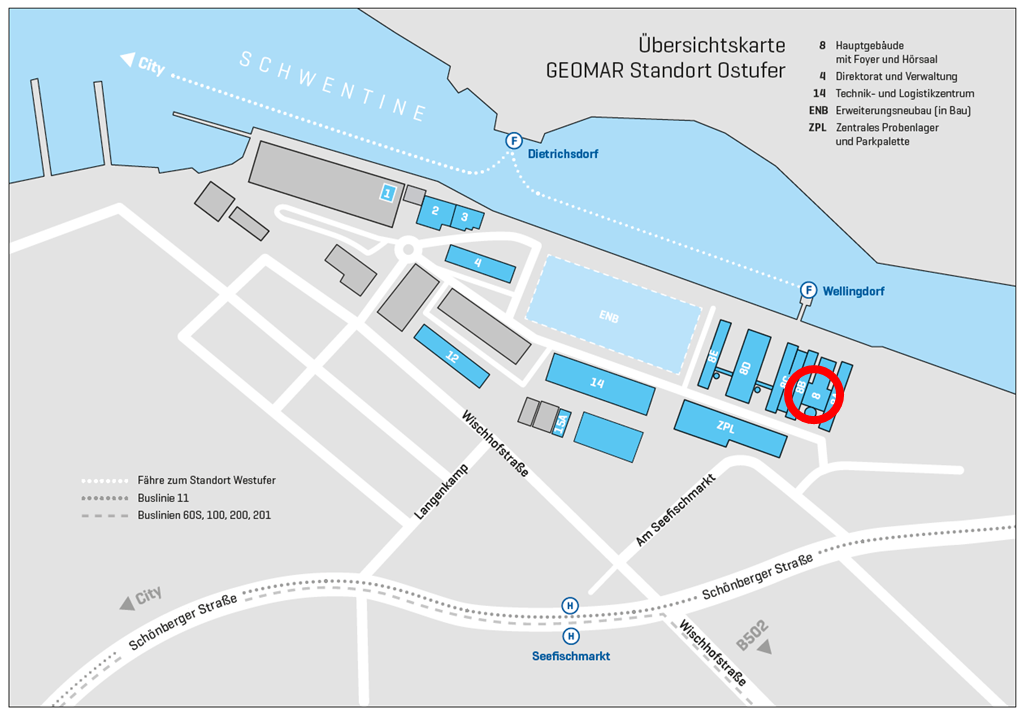- Indico style
- Indico style - inline minutes
- Indico style - numbered
- Indico style - numbered + minutes
- Indico Weeks View
Topic 2 Annual Meeting - 2023In-Person Event
→
Europe/Berlin
GEOMAR
Wischhofstraße 1-3, 21418 Kiel
, , , , ,
Description

Welcome to the annual meeting of Topic 2!
The annual Topic 2 meeting in 2023 will focus on hot science, joint research activities and will put a spotlight on Early Career Scientists.
More than 80 scientists will meet in person at GEOMAR in Kiel to intensify the scientific collaboration between the three centers AWI, GEOMAR and GFZ.
Venue of the meeting
GEOMAR, Wischhofstraße 1-3, 24148 Kiel
Building 8 (marked in red on the map below)

Busses:
You can get all busses from central station, but you must take the busses that leave from the bus stop opposite the main station!
Further information: www.kvg-kiel.de
Line 60S => direction „Schwentinestr. (FH Kiel)“; Departure: D2; Exit: „Seefischmarkt“
Line 11 => direction „Dietrichsdorf“; Departure: D2; Exit: “Seefischmarkt”
Line 210 => direction “Schönberg”; Departure: B2; Exit: “Seefischmarkt”
Line 200/201 => direction “Schönberger Strand”; Departure: B2; Exit: “Seefischmarkt”
Food: We will offer exclusively vegetarian and vegan food.
Accomodation: We recommend the following particularly centrally located hotels within the usual cost range (see also "List of hotels"). The booking codes ("Buchungscode") can be used to get a discount on hotel bookings.
Please note: The reservation, booking and payment of the rooms is the responsibility of the individual participants.
- Hotel Kiel by Golden Tulip, Hamburger Chaussee 2, 24114 Kiel
"Buchungscode": BUND, Price: 65€ plus 8,50€ breakfast - Adagio Access Kiel / ibis Styles Kiel, Holstenbrücke 28 / 26, 24113 Kiel
"Buchungscode": SC332619717, Price: 76€ - 86€ (incl. breakfast) - Hotel Berliner Hof, Ringstraße 6, 24103 Kiel
"Buchungscode": BUND, Price: 79€ - 119€ (incl. breakfast) - InterCityHotel Kiel, Kaistraße 54 - 56, 24114 Kiel
"Buchungscode": CINOQZ, Price: 85€ - 105€ (incl. breakfast)
Contact
Registration
Registration for the Topic 2 Annual Meeting in 2023
Participants
Aaron Hornschild
Abhishek Savita
Almut Brunner
Anna Christina Hans
Arnaud Nicolas
Arne Biastoch
Barbara Neumann
Beate Slaby
Dirk Nuernberg
Dörthe Handorf
Edmund Hathorne
Eleni Anagnostou
Fehmi Dilmahamod
Florian Adolphi
Florian Schuette
Forough Hassanibesheli
Frank Lamy
Gerhard Helle
Gerrit Lohmann
Helge Goessling
Hendrik Grotheer
Henryk Dobslaw
Ilka Weikusat
Jan Saynisch-Wagner
Joakim Kjellsson
Johannes Karstensen
Joke Luebbecke
Julia Loftfield
Klaus Grosfeld
Lars Nerger
Laura Kattein
Lavinia Patara
Lester Lembke-Jene
Lina Roeschel
Maik Thomas
Marco Landt-Hayen
Marcus Dengler
Marcus Gutjahr
Maria Hörhold
Marleen Lausecker
Martin Frank
Martin Werner
Marylou Athanase
Mathias Zeller
Meike Bagge
Mike Sips
Moritz Hallmaier
Ole Zeising
Oluwaseun Soaga
Peter Brandt
Ralf Tiedemann
Rebecca Hummels
Rebecca Kearney
Remi Dallmayr
Renate Treffeisen
Rik Tjallingii
Robert Heinkelmann
Robert Spielhagen
Rodrigue Anicet Imbol Koungue
Sabine Bischof
Saskia Esselborn
Sergiy Vorogushyn
Stephan Juricke
Stephanie Fiedler
Tania Marcos Lima Pinho
Thomas Jung
Thomas Laepple
Tobias Bayr
Tobias Gereon Schulzki
Torge Martin
Volker Klemann
Walter Geibert
Willi Rath
Zhouling Zhang
